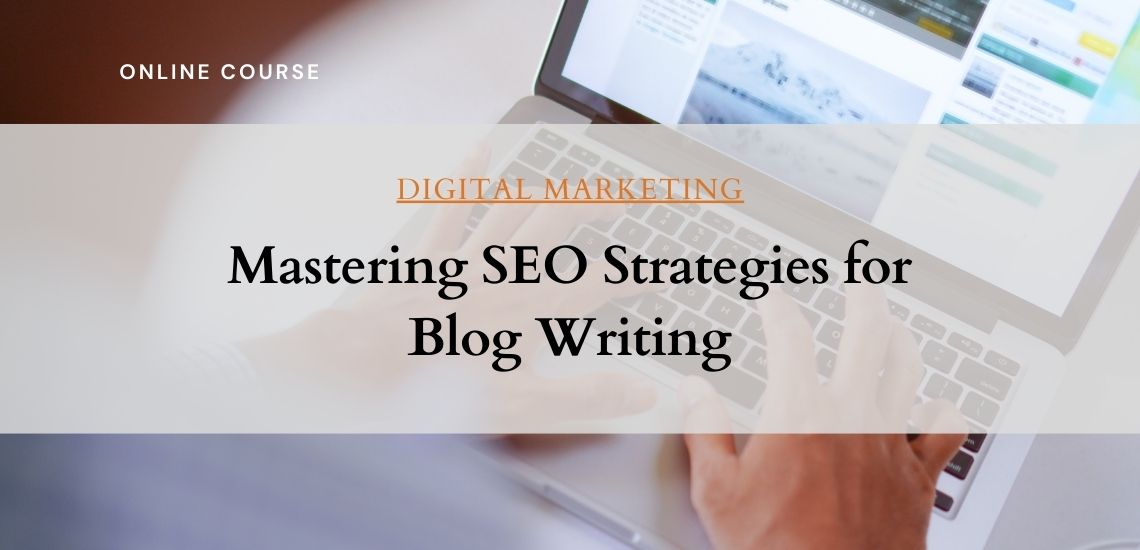
Course Title: Mastering SEO Strategies for Blog Writing
Course Overview:
This course provides a comprehensive understanding of SEO strategies specifically tailored for blog writing. Participants will learn how to enhance their blog’s visibility, engage their audience effectively, and drive substantial traffic through advanced SEO techniques. By the end of this course, students will be equipped with actionable strategies to optimize their blog content and achieve top rankings in search engine results.
Duration: 4 weeks (8 modules)
Format: Online, self-paced with interactive quizzes and assignments
Module 1: Introduction to SEO for Blogs
- Lesson 1.1: Understanding SEO and Its Importance
- Definition and benefits of SEO
- How SEO affects blog visibility and audience reach
- Lesson 1.2: Overview of Effective SEO Strategies
- Key components of a successful SEO strategy
- How SEO integrates with content marketing
Module 2: Conducting Thorough Keyword Research
- Lesson 2.1: The Foundation of Keyword Research
- Importance of keywords in SEO
- Types of keywords: Short-tail vs. long-tail
- Lesson 2.2: How to Conduct Keyword Research
- Tools: SEMrush, Ahrefs, Google Keyword Planner
- Analyzing competitors for keyword opportunities
- Lesson 2.3: Best Practices for Keyword Research
- Prioritizing quality keywords
- Natural keyword incorporation
- Regular updates and adjustments
Module 3: Optimizing Titles and Meta Descriptions
- Lesson 3.1: Crafting an Effective Title
- Importance of titles in SEO
- Techniques for creating compelling and keyword-rich titles
- Lesson 3.2: Writing Engaging Meta Descriptions
- Role of meta descriptions in CTR
- Crafting summaries that include CTAs and relevant keywords
- Lesson 3.3: Best Practices for Titles and Meta Descriptions
- Testing and monitoring variations
- Using tools to track performance
Module 4: Creating High-Quality, Engaging Content
- Lesson 4.1: The Role of Content in SEO
- How quality content impacts search rankings
- Elements of high-quality blog content
- Lesson 4.2: Techniques for Writing Engaging Content
- Structuring content for readability
- Incorporating visuals and updates
- Lesson 4.3: Content Quality Best Practices
- Proofreading and editing
- Tools for readability assessment and engagement encouragement
Module 5: Implementing On-Page SEO Best Practices
- Lesson 5.1: Key On-Page SEO Elements
- Header tags, internal linking, and URL structure
- Image optimization and schema markup
- Lesson 5.2: On-Page SEO Optimization Techniques
- Ensuring positive user experience
- Avoiding keyword stuffing
- Lesson 5.3: Monitoring and Adjusting On-Page SEO
- Regular review of on-page elements
- Adapting to SEO changes and best practices
Module 6: Optimizing for Mobile and Page Speed
- Lesson 6.1: Importance of Mobile Optimization
- Responsive design and mobile usability
- Testing and optimizing mobile performance
- Lesson 6.2: Techniques for Page Speed Optimization
- Compressing images, leveraging browser caching, and using CDNs
- Minimizing HTTP requests and optimizing code
- Lesson 6.3: Best Practices for Mobile and Speed Optimization
- Performance tracking tools
- Regular updates for mobile and speed improvements
Module 7: Leveraging Social Media and Content Promotion
- Lesson 7.1: Social Media Promotion Strategies
- Sharing blog posts and using hashtags
- Engaging with the audience and collaborating with influencers
- Lesson 7.2: Content Promotion Techniques
- Email marketing, guest blogging, and paid promotions
- Content syndication and its benefits
- Lesson 7.3: Best Practices for Promotion
- Tracking performance of promotional efforts
- Adjusting strategies based on data
Module 8: Monitoring and Analyzing Performance
- Lesson 8.1: Key Metrics to Track
- Organic traffic, bounce rate, average time on page, CTR, and backlinks
- Lesson 8.2: Analyzing Data and Adjusting Strategies
- Identifying trends and making data-driven decisions
- A/B testing and regular performance reviews
- Lesson 8.3: Best Practices for Performance Monitoring
- Using multiple tools for comprehensive insights
- Setting goals and benchmarks for SEO success
Final Project:
- Develop a Complete SEO Strategy for a Blog Post
- Conduct keyword research
- Create optimized titles and meta descriptions
- Implement on-page SEO and mobile optimization
- Develop a content promotion plan
- Monitor and analyze the performance of the blog post
Certification:
Upon successful completion of the course and final project, participants will receive a certificate in SEO Strategies for Blog Writing, demonstrating their ability to effectively implement and manage SEO strategies for enhanced blog visibility and performance.
Enroll Now:
Start mastering SEO strategies for blog writing and elevate your content to new heights. Enroll today and transform your blog into a traffic-generating powerhouse!

